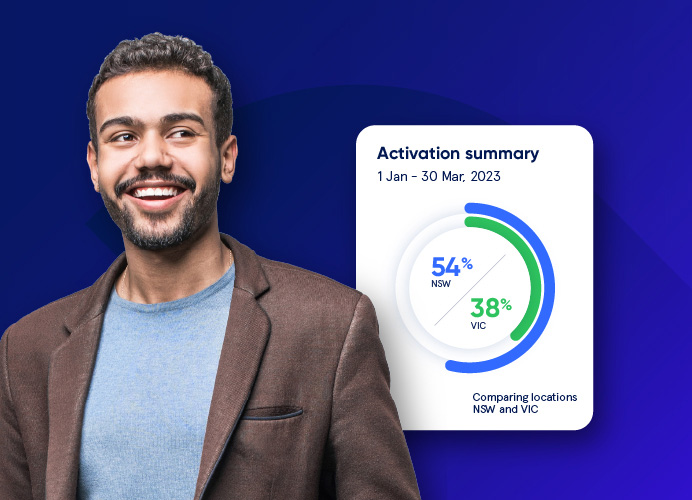Do employees need medical support more than mental health support?

Insights.
Over the years, employee wellbeing initiatives “to keep employees happy” have been many and varied. They’ve included everything from yoga studios, food trucks, NASA sleep pods, climbing walls, puppytoriums, karaoke parties, music-jam sessions, wine bars, massage, in–office scooters, volleyball courts, and more.
The most common denominator in employee wellbeing programs has been access to professional mental health support. This is for good reason, given the rise in mental health concerns, marked by the federal government’s $2.3 billion investment last year in mental health and suicide prevention. But, our data suggests employees are seeking medical support more than mental health support.
Member support cases: July to September 2022
Last quarter, our care professionals helped 10,000+ employees and students with safety, medical, mental health, and miscellaneous support. Our support cases ranged from concerns about financial pressures and work stress, to back pain and injuries, to pre-natal advice and sick infants, to customer aggression and bullying by managers, to domestic violence and suicide ideation, to car accidents and hospital visits, to floods and natural disasters - or simply because they wanted to have a chat.
The volume of cases last quarter (July to September) represents a significant data set from which to extrapolate meaningful insights. So, what were two of our key findings?
- More people reached out to us for medical support than for either mental health or safety support. This may be surprising for People and Culture (P&C) leaders who have newly signed up for our service and who were not aware of the untapped need within their teams for medical support.
- A significant proportion of the workforce is navigating diverse and often complex health challenges. This is likely costing organisations time and money in reduced productivity, higher rates of absenteeism and presenteeism, delayed return to work, unnecessary employee turnover, and more.
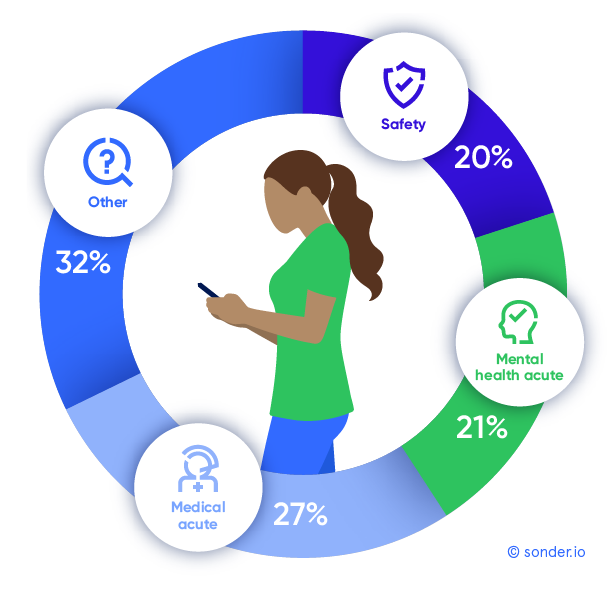
What types of medical support do employees need?
As a health provider accredited by the Australian Council on Healthcare Standards (ACHS), our innovative model of care enabled our multidisciplinary team of clinicians (including registered nurses and specialist physicians) to triage and diagnose over 100 distinct medical diagnoses this year.
This again demonstrates how personalised that wellbeing support needs to be if it’s going to meaningfully move the needle on the underlying issues affecting employee wellbeing at work.
The 30 most common conditions that Sonder diagnosed in the July-September period:
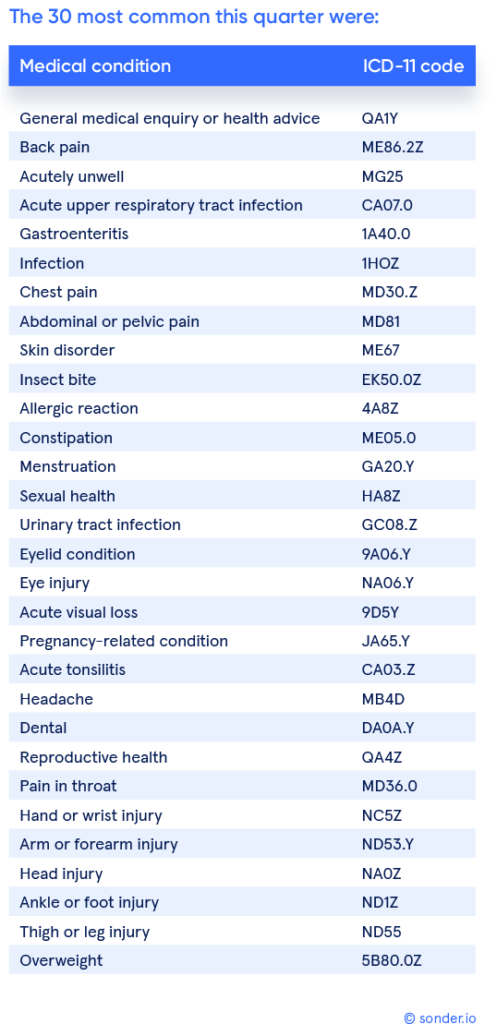
Why are employees turning to employer-funded medical support?
Unlike employers in countries such as the United States, employers in Australia rarely offer paid medical support for their employees. But, this could soon change, as wait times increase and access block is exacerbated.
Australians are waiting longer for urgent GP appointments. “The Australian Bureau of Statistics (ABS) found 49.5 per cent of people living in outer regional, remote or very remote areas had to wait for 24 hours or more to see a GP for urgent medical care, compared with 35.5 per cent of those living in major cities,” reported News Limited. Hospitals are seeing longer queues in their emergency departments. The Age reported that Melbourne’s Royal Children’s Hospital saw a 12-hour emergency queue earlier this month, and “with extremely high levels of acuity of our already admitted inpatients, it is not safe to discharge patients to free up beds,” a statement from the hospital said.

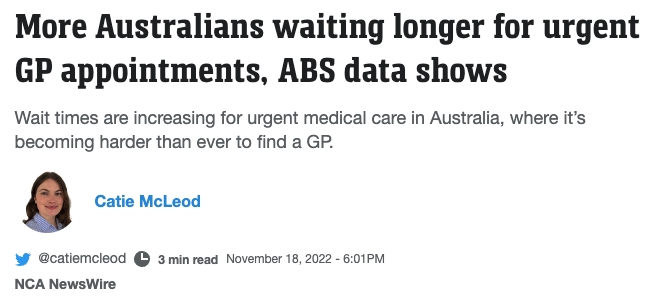

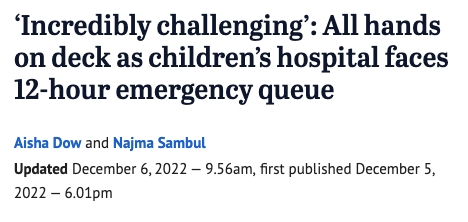
These trends are backed up by the not-for-profit Australasian College for Emergency Medicine (ACEM) in their State of Emergency 2022 report released last month. “Across Australia and in almost every State and Territory, 2020-2021 saw the highest number of emergency department presentations ever recorded, while the increase in emergency department presentations over the past five years has exceeded population growth.”
“Access block for medical and mental health care is the most pressing issue of our time. More and more members are reaching out to us because they are feeling blocked from accessing care due to cost, or they cannot access quality care within a reasonable amount of time. For the first time in Medicare's history, the average out-of-pocket cost (gap payment) for a standard GP consult exceeds the Medicare rebate that a patient receives. With the average out-of-pocket charge increasing by 50 per cent over the last decade, people are increasingly looking for alternative ways to access professional medical care.”
—Dr Jamie Phillips
Medical Director, Sonder
Most of our 10,000+ support cases last quarter were started outside of 9am-5pm, with many members stating they would not have even reached out for help if they did not have a support option available 24/7. Our ‘always open’ offering was likely another reason why so many members reached out to us for medical support.

What does this mean for HR/P&C leaders?
Health-savvy HR/P&C leaders understand that the world of employee wellbeing support is expanding. However, some are so inundated with the myriad of new offerings that they feel lost in a maze of shiny objects and misinformation.
Data-focussed leaders are looking for numbers. They need data, insights, case studies and/or peer referrals to construct solid business cases for their executive/board meetings that are based on quantitative, not just qualitative, metrics.
That’s where our data set comes in.
Based on our 10,000+ active member support cases last quarter, here are some suggested areas of focus for HR/P&C leaders:
- Broaden your wellbeing offering to include medical. Immediate access to medical advice can help employees stay healthy and productive at work (and avoid needing time off to attend medical consultations).
- Amplify your existing medical offering. If your organisation already offers medical support, proactively share stories to educate and/or remind employees that they (and ideally their families) can access medical support whenever they need it. On-demand care can help someone get a better night’s sleep, save them a trip to the emergency room, and in suicide ideation cases, save their life.
- Build a culture that understands health complexity. Raise awareness about how health is complex and impacts people differently. Encourage a culture that is mindful of health challenges and questions assumptions about wellbeing. Reduce stigma in the workplace by normalising conversations about the interconnectedness of mind, body, community, and environment.
Want to learn more?
For more information about how Sonder can help you rethink your employee and student support, we invite you to contact us here.
For Sonder customers who have not already received a copy of our in-depth Quarterly trends report last quarter, we invite you to reach out to your point of contact at Sonder to access our full data, insights, and commentary.
About Sonder
Sonder is an Active Care technology company that helps organisations improve the wellbeing of their people so they perform at their best. Our mobile app provides immediate, 24/7 support from a team of safety, medical, and mental health professionals - plus onsite help for time-sensitive scenarios. Accredited by the Australian Council on Healthcare Standards (ACHS), our platform gives leaders the insights they need to act on tomorrow's wellbeing challenges today.
Related posts
There's so much more to share
Sonder is reimagining health, safety and wellbeing support. Sonder proves human centric care leads to earlier intervention. Sonder impacts one person at a time to drive meaningful change across an organisation. Sonder understands people and how to support them.




